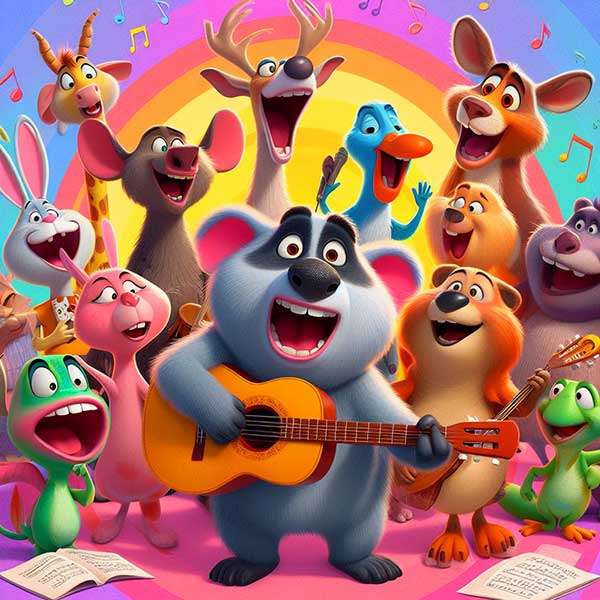
The Hilarious Replay: Typical Themes of Song Parodies
Song parodies twist familiar tunes with new lyrics, creating humor, social commentary, or heartwarming messages. Here are some popular themes:
- Pop Culture Quirks: Parodies turn mundane tasks into dramatic adventures (power ballad about grocery shopping), poke fun at trends (song about fidget spinners), and playfully critique celebrity culture (country song about a heartbroken A-lister).
- Love and Relationships: Breakups get a humorous twist (breakup ballad transformed into an ode to single life), the awkwardness of modern dating is explored (song about online dating mishaps), and the joys (and struggles) of married life are celebrated (blues song about snoring spouses).
- Social Commentary: Parodies can cleverly address consumerism (catchy tune about the pressure to keep up with trends), highlight workplace woes (heavy metal anthem about fighting mall crowds), or wade into politics (rap battle between historical figures).
- Beyond the Obvious: Learning can be fun with parodies (pop song about the life cycle of a frog), movies and TV shows get a comedic twist (characters from different shows interacting), genres get mashed up (sea shanty about writing a parody song), and parodies can even parody themselves!
The Hilarious Replay: Typical Themes of Song Parodies (1998 words)
Song parodies hold a special place in music. They take well-known tunes and twist the lyrics to create humor, social commentary, or even heartwarming messages. But what makes a good parody? Part of the magic lies in the familiar melodies carrying unexpected themes. Let’s delve into the typical themes that song parodies love to skewer and sing about.

Poking Fun at Pop Culture’s Quirks
- Everyday Struggles Turned Epic: Ever feel like doing laundry is a heroic quest? Parodies excel at turning mundane tasks into dramatic adventures. Imagine a power ballad about the trials of grocery shopping (“I Spent Hours in the Aisle, Searching for the Perfect Kale”), or a heavy metal anthem for cleaning the dishes (“Scouring Pads of Fury”). The juxtaposition of a grand musical style with a relatable, everyday situation creates instant humor.
- Fads and Trends Under the Microscope: Remember fidget spinners? Parodies were there to capture the fleeting nature of trends. They can take aim at fashion (“Skinny Jeans, Can’t Breathe No More”), technology (“My Phone is Always Dead”), or even social media obsessions (“I Gotta Get Those Likes”). By highlighting the absurdity of some trends, parodies make us laugh and reflect on our cultural moments.
- Celebrity Culture and Gossip: The world of celebrities is ripe for parody. Songwriters can play with public personas, exaggerate rumors, or simply revel in the outlandishness of it all. Imagine a country song about a heartbroken A-lister (“They Canceled My Reality Show”), or a rap battle between rival reality TV stars. Parodies can be a playful commentary on the cult of celebrity.
Love and Relationships: A Parody Playground
- The Dreaded Breakup, Played for Laughs: Breakups are tough, but parodies can offer comedic relief. We might see a power ballad transformed into a sprightly ode to single life (“Finally Free, and Feeling Fine”), or a love song twisted into a bitter rant about a cheating ex (“You Lied Like a Cheap Rug”). Parodies allow us to laugh at the heartbreak and find humor in the universal experience of love gone wrong.
- The Quirks of Dating in the Modern Age: Finding love in the digital era provides ample material. Parodies can explore the awkwardness of online dating profiles (“Swiping Left and Right All Night”), the perils of texting mishaps (“Sent That Emoji by Mistake”), or the frustration of ghosting (“Where’d You Go, My Matchmaker Woe?”). By lampooning the challenges of modern dating, parodies offer a relatable and often hilarious perspective.
- The Joys (and Struggles) of Married Life: Married life isn’t always sunshine and roses, and parodies are happy to point that out. We might see a romantic ballad morph into a blues song about snoring spouses (“Can’t Sleep With That Symphony”), or a pop song transformed into a hilarious list of “Things I Never Thought I’d Do After Getting Married” (like unclogging the toilet). By playfully exaggerating the challenges of marriage, parodies offer a lighthearted look at a universal experience.

Social Commentary with a Wink and a Smile
- Consumerism and Retail Hell: Parodies can cleverly critique our consumerist culture. Imagine a catchy pop tune about the pressure to keep up with the latest trends (“Gotta Have the Newest Stuff”) or a heavy metal anthem for fighting mall crowds (“Black Friday Fury”). By using humor, parodies can spark reflection on our shopping habits and the societal emphasis on material possessions.
- Work Woes and Office Shenanigans: The workplace can be a source of frustration, but also humor. Parodies can capture the monotony of office life (“Stapler Jam, Paper Cuts, My Day is Doomed”) or the absurdity of corporate jargon (“Synergy This, Optimize That”). By making light of the daily grind, parodies offer a sense of camaraderie for those who spend most of their waking hours in cubicles.
- Politics and Current Events (Handled with Care): Parodies can wade into the realm of politics, but it requires a deft touch. They might use humor to highlight a particular issue (“Taxes, Taxes, Taking All My Money”) or poke fun at political figures (“Campaign Promises, Always Broken”). It’s important for political parodies to strike a balance between humor and being respectful, but when done well, they can be a powerful tool for social commentary.
Beyond the Obvious: Unexpected Parody Themes
Educational Parodies: Learning doesn’t have to be dry! Parodies can be a fun way to make historical events or scientific concepts more engaging. Imagine a pop song about the life cycle of a frog (“From Tadpole to Prince, What a Change!”) or a rap battle between historical figures (“Alexander vs. Cleopatra: The Rap Diss for the Ages”). Parodies can make learning fun and memorable for all ages.
- Movie and TV Parodies: Taking aim at beloved films and television shows is another popular theme. Parodies can rewrite iconic scenes with a comedic twist (“We’re Going on a Quest… to Find the Remote”), or imagine characters from different shows interacting (“The Gang Solves the Mystery of the Missing Cookies”). By playing with audience expectations and referencing pop culture touchstones, these parodies create a sense of shared amusement.
- Genre Mashups: Parodies can get truly creative by blending genres. Imagine a heavy metal lullaby (“Hush Little Baby, Don’t You Cry, the Monsters are Coming to Get You… By the Sword”) or a sea shanty about the struggles of writing a parody song (“Stuck in Writer’s Block, the Rhyme Just Won’t Flow”). By blurring the lines between musical styles, these parodies create a surprising and often hilarious effect.
- The Parody Song About Parody Songs: Yes, even parodies can become the subject of parodies! This meta-humor celebrates the art form itself, poking fun at the conventions of song parodies and the artists who create them. It’s a playful wink to the audience, acknowledging the shared love for this unique musical genre.
The Power of Parody: Laughter and Reflection
Song parodies offer more than just laughs. They can be a form of social commentary, a way to cope with everyday struggles, or simply a celebration of shared cultural experiences. By taking well-known songs and twisting the lyrics, parodies remind us of the power of music to connect, entertain, and make us think. So next time you hear a parody, take a moment to appreciate the clever wordplay, the unexpected themes, and the timeless art of using humor to hold a mirror up to ourselves and the world around us.

Song parodies offer laughter, social commentary, and a way to connect over shared experiences. They use humor to hold a mirror up to ourselves and the world around us.
